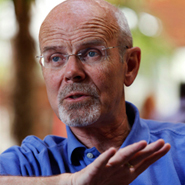Posted 01 July 2015
Political philosopher Pettit says enriching ‘ecology’ of collective responsibility could help solve important global issues
Individuals lack the moral capacity to make responsible decisions that would benefit mankind on important global issues such as climate change, and instead they should become members of “incorporated” bodies that would oblige them to act for the common good.
This is according to Professor Philip Pettit, Professor of Politics and Human Values at Princeton University and also Professor of Philosophy at the Australian National University, who was one of the keynote speakers at a conference entitled ‘Collective Responsibility for the Future’ held recently at UCD.
The conference was a forum for presenting recent scholarship on what kinds of responsibilities collectives might have with regard to the future.
The Infrastructure of Democracy | Prof Philip Pettit | UCD Garret FitzGerald Summer School 2014
Professor Pettit works in the area of moral and political theory and on issues linked to the philosophy of the mind and metaphysics.
In his keynote speech, entitled ‘Incorporating for Responsibility’, he said individuals are generally only capable of making responsible decisions on critical issues when they are guided by social infrastructures or the “ecology of responsibility” that supports commonly accepted moral standards.
He holds that individuals need to “enrich the ecology in which we live by building up standards of personal performance in relevant areas”.
Individuals could do this by joining “incorporated” bodies which “capacitate”, and through a sense of collective duty and scrutability, oblige their members to play their part in acting upon and promoting issues such as solar power and the reduced consumption of meat and antibiotics.
Professor Pettit said: “I sort of see that as the best hope for looking after our fragile future given the sort of frail species that we are. I just don’t think that we have the moral capacities that we think we have, we depend on social organisation to get them,” he said.
“I think that we individually have them [moral capacities]…but it is very hard to get them when it is a matter of free riding sorts of issues, such as there are in the global action and climate change sort of scenario.
“Maybe the best hope is that there are these incorporated bodies that will themselves be powerful, themselves that will be held responsible and ultimately will be politically effective.”
He said there are causes such as future global welfare that require “our current generation” to act. Short of political coercion, we can only hope to elicit action via “ecological moralisation”.
Individuals may do this by eliciting cooperation for public action. This would require organising a group plan of action, or a group incorporation, where there is a range of connected cases or issues.
“I think that where collectives are not organised or corporatised or corporated…they don’t have a constitution, they don’t have an organisation. But if you have an organised body with a constitution with rules, with how things are done etc, then, of course, that sort of body can respond to reason,” he said.
“It can have the capacity to register and act on reasons, and we can by holding it responsible, elicit that very capacity.”
He said that such organisations would be analogous to bodies like Greenpeace, Amnesty international, a feminist movement, or a prisoners’ rights group.
“I think our best hope is to look for incorporated bodies, for example, that would promote offset fees in travel, so if you join up it’s just a matter of automatic, from your point of view, obligation that you would indeed pay the carbon offset fee if you are travelling,” he continued.
“This body can also promote reliance on solar power, local food production, reduced consumption of meat, reduced consumption of antibiotics, a body like this that really formed, that we all joined.
“So, we would all be part of this group, people would gain positive esteem for being members, and you might get the sort of cascade whereby more and more people joined if a group like that really developed, then it might equally be a very powerful political presence.”
A native of Co Galway, Professor Pettit was educated at the National University of Ireland, Maynooth, and Queen's University Belfast.
He was also previously a student at UCD and achieved first class honours in his BA and MA degrees at the university in the 1960s. He later lectured in the former Department of Ethics and Politics in UCD.
The conference was supported by the UCD College of Human Sciences, Georgia State University, UCD Research Seed Funding Scheme 2015, and UCD School of Politics and International Relations.(Produced by UCD University Relations)

